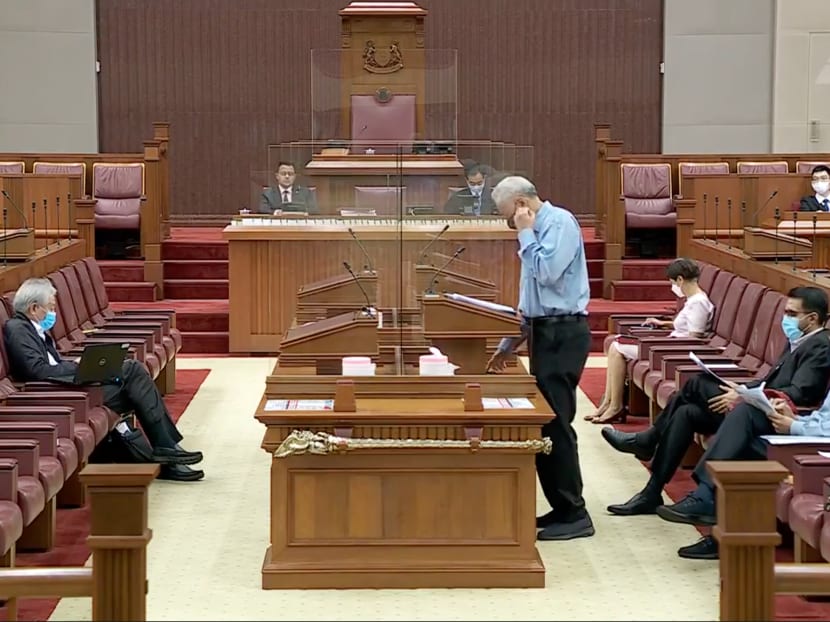Day 1 of debate on government spending: What you need to know
SINGAPORE — The Committee of Supply (COS) debates began in Parliament on Wednesday (March 2), following the end of a debate over the Budget that began on Monday.

Defence Minister Ng Eng Hen speaking during the Committee of Supply debate in Parliament on March 2, 2022.
- The Committee of Supply (COS) debates began in Parliament on Wednesday (March 2), following the end of a debate over the Budget that began on Monday
- Various ministers spoke, including those overseeing the Prime Minister’s Office’s Smart Nation and Digital Government Group
- Funding support for genetic testing before in-vitro fertilisation and the establishing of a fourth service in the Singapore Armed Forces to tackle digital threats were among the announcements made
SINGAPORE — The Committee of Supply (COS) debates began in Parliament on Wednesday (March 2), following the end of a debate over the Budget that began on Monday.
The COS debates allow Parliament to examine each ministry’s plans. Members of Parliament file “cuts” to speak on issues under the various government ministries’ purview.
Among the government leaders that fielded questions on Wednesday were ministers overseeing the Prime Minister’s Office’s Smart Nation and Digital Government Group, Monetary Authority of Singapore, National Population and Talent Division as well as the Finance and Defence ministries.
Several announcements were made during their speeches, ranging from funding support for genetic testing before in-vitro fertilisation to the establishment of a fourth service in the Singapore Armed Forces to tackle digital threats.
Here is what you need to know:
NATIONAL POPULATION AND TALENT DIVISION (NPTD)
New funding support for genetic testing: The Government will introduce new funding support for certain types of pre-implantation genetic testing — a technique used to identify genetic defects in early embryos created through in-vitro fertilisation (IVF). This is to “address the concerns that some couples have over genetically transmitted diseases”, said Ms Indranee Rajah, Minister in the Prime Minister's Office. The announcement comes amid a growing trend of Singaporeans marrying later. More details will be released at a later date.
Support for well-being of children and their families: The Child and Maternal Health and Well-Being Taskforce is currently developing a five-year national strategy to further support the physical, mental and cognitive well-being of children and their families. More details will be provided by Social and Family Development Minister Masagos Zulkifli.
Making flexible work arrangements a norm: Drawing a distinction between Work From Home (WFH) and Flexible Work Arrangements (FWA), Ms Indranee said: “WFH is only one type of FWA. Not all job types are suitable for WFH, but all job types can accommodate some form of FWAs, depending on the nature of the job.” She noted that adopting flexible work arrangements and prioritising employee well-being would benefit workers and consequently families. More will be shared in the White Paper on Singapore Women’s Development which will be tabled in Parliament this year.
Slight increase in total fertility rate: Singapore’s Total Fertility Rate (TFR), a measure of births per female of childbearing age, rose to 1.12 last year, up from the historic low of 1.10 in 2020, though it remains lower than before the pandemic. The preliminary number of resident births in 2021 remained similar to 2020 at around 34,200 but the number of females of childbearing age decreased over time, which contributed to the increase in TFR.
Number of new citizenships similar to pre-pandemic levels: 21,500 new citizenships were granted in 2021. This included about 1,200 citizenships granted to children born overseas to Singaporean parents and 33,400 to new permanent residents (PRs). According to Ms Indranee, these numbers are similar to pre-Covid levels and higher than those in 2020 due to the easing of travel restrictions and safe management measures, which previously slowed down in-person processes for the granting of citizenship or PR. Applicants who were approved in-principle in 2020 and had not completed all the required processes to be granted PR or citizenship were subsequently granted PR or citizenship in 2021, adding to the year's numbers.
Aspirations for marriage and parenthood remain high: The 2021 Marriage and Parenthood Survey commissioned by the National Population and Talent Division found that eight in 10 young singles (aged 21 to 35) aspire to marry and have children, and over nine in 10 married Singaporeans aged 21 to 45 want to have at least two children.
PUBLIC SERVICE DIVISION (PSD)
More ServiceSG Centres to be set up in community centres: PSD will extend the pilot of ServiceSG centres to serve citizens better by integrating services across agencies and leveraging technology. The concept is now being piloted at Our Tampines Hub and will be set up at community centres, with the first two service centres opening in Nee Soon Central and Kampong Chai Chee Community Clubs.
Public officers to get time off for developmental activities: From 2022, public officers will receive up to 40 hours per year to participate in developmental activities with private, social and non-profit organisations. This is so that they will have “a deep understanding of the people and organisations they are serving” and “continue to learn from the sectors and organisations beyond the public service”, said Education Minister and Minister-in-charge of the Public Service Chan Chun Sing.
SMART NATION AND DIGITAL GOVERNMENT GROUP
GovWallet: Government agencies can now use a new e-wallet feature to disburse money to citizens that can be spent using PayNow or withdrawn at an automated teller machine. GovWallet is not a standalone application but a digital feature that can be integrated with mobile apps. So far, the Ministry of Defence has started using GovWallet via the Government’s LifeSG app to give out national service recognition benefits to operationally ready servicemen.
Improvements to Singpass: Since last week, the Singpass app has been translated from English to Malay, Mandarin and Tamil. From March 7, users will be able to access a digital driving licence under the “My Cards” section in the app. And later this month, business users with valid Corppass accounts will be able to access their companies' profiles and related information on Singpass.
MINISTRY OF DEFENCE
Digital and Intelligence Service: The Singapore Armed Forces (SAF) will establish a new service by the fourth quarter of this year to meet emerging threats in the digital domain. This will be the SAF’s fourth service alongside the existing Army, Navy and Air Force. "The digital terrain has become as real as the land, air and sea domains for which we have raised the Army, the Air Force and the Navy," said Defence Minister Ng Eng Hen.
Default base pay for in-camp training: NSmen who are unemployed or ineligible for make-up pay claims will now get a S$1,600 monthly base pay instead of payment pegged to their rank. The new base pay will be pro-rated based on the length of their in-camp training or other operationally ready NS (ORNS) activities. NSmen holding civilian jobs with salaries higher than S$1,600 will continue to be paid the equivalent to what they earn in their civilian jobs.
Automated make-up pay claims system: Make-up pay claims, which top up NSmen’s training pay to match their civilian income, will be automatically computed using data from other government agencies.
Enhanced NS Home Awards: Each NSman will get an additional S$2,000 in cash after completing all of the three milestones under the NS Housing, Medical and Education Awards, including completing their full-time NS and completing their ORNS cycle.
‘Functional assessments’: The SAF will now start using "functional assessments" as part of its medical screenings for pre-enlistees to better match them to their vocations. They were first introduced in a trial last year to select transport operators, using assessments that replicate the physical demands of daily operations.
Sustainability efforts: By the end of the year, about a quarter of SAF camps will have solar panels installed. All of the SAF’s administrative vehicle fleet will be replaced with electric vehicles by 2030.










